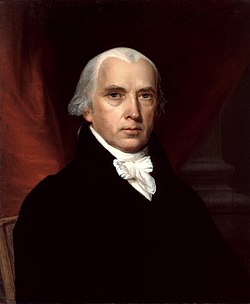James Madison
| God, guns, and freedom U.S. Politics |
| Starting arguments over Thanksgiving dinner |
| Persons of interest |
James Madison was the primary author of the United States Constitution as well as the Bill of Rights that was added to it. He also served as the 4th President of the United States.
As an author of the Constitution
As the Articles of Confederation began to crumble, Madison took it upon himself to draft a new constitution for the country (commonly known as the "Virginia Plan"). James Madison was by no means a novel political theorist. Still, in crafting the US Constitution, he drew on a long legacy of such writings in Europe, notably John Locke and Montesquieu. It called for a separation of power and checks and balances while still giving the federal government more centralism and overall control.
In the end, the Virginia plan was not accepted wholesale, but was instead modified dramatically to win approval by all of the 13 states. Despite the modifications, James Madison still argued (along with Alexander Hamilton and John Jay) for the states' ratification. Together, the three wrote the Federalist Papers to argue for a stronger government. (Sadly, after this, Hamilton and Madison became strong political enemies, with Hamilton wanting a much stronger federal government than Madison was comfortable with.) This shows once again that the founding fathers were anything but a homogeneous bloc and that they had vastly different opinions on almost all issues, including the meaning of the very constitution they had agreed on.[1]
Initially, Madison was opposed to a separate "Bill of Rights", fearing it would be only a paper cover and would specifically make people think that rights not listed did not exist. However, it became clear that it would not be accepted without some kind of additional modifications. So Madison wrote up some of the first explicit prohibitions for a government to be involved in matters of conscience. His original desire was for these to be applied to the states as well, but that had to wait until after the American Civil War. Interestingly enough, the US Bill of Rights was passed the same year as the French declaration of human rights. Neither of those made any mention of women's rights, of course.[2] That would just be crazy talk.
President
Madison's presidency was mostly taken up with the rivalry (and then war) with Great Britain. The war saw some very dramatic losses for the United States, including the sacking of Washington, DC, but the conflict was considered a clear draw by the end. Many in the US saw it as a win, as they thought it consolidated the US's status as an independent nation.
A much more successful war was waged against the Barbary Pirates yet again, bringing an end to the U.S. habit of paying tribute to them. The Barbary Pirates had notably been beaten before a few years earlier but had chosen to take advantage of a weakened U.S.A. that was at war with Britain and therefore unable to react. From this early episode in US military history, we get the "...to the shores of Tripoli" line in the marines' song.[3] Notably, Madison was the smallest president, only 5'4" and about 100 pounds.[4]
References
- ↑ Take that Antonin Scalia
- ↑ The French word "homme" as in "droit de l'homme" can mean both "man" and "human" just like "man" used to include women as well
- ↑ The "Halls of Montezuma", on the other hand, refer to the Mexican-American War—though that seems kind of ironic since Montezuma's halls, indeed all his buildings, had long since been destroyed by the time of the war.
- ↑ Presidential Height, Weight, and BMI


